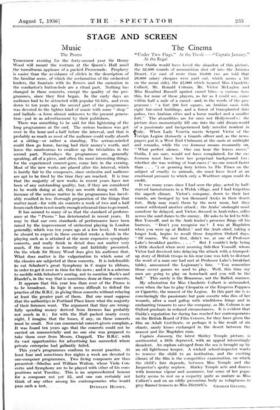The Proms M u sic
STAGE AND SCREEN
TOMORROW evening for the forty-second year Sir Henry Wood will mount the rostrum at the Queen's Hall amid the tumultuous applause of a packed Promenade. Prophecy is easier than the avoidance of cliches in the description of the familiar scene, of which the acclamation of the orchestral leaders, the fountain with its flowers and the carnation in the conductor's button-hole are a ritual part. Nothing has changed in these concerts, except the quality of the pro- grammes, since they first began. In the early days • an audience, had to be attracted with popular tit-bits, and even down to ten years ago. the second part of the programmes was devoted to the lighter kind of music with some " shop " and ballads—a form almost unknown to the present genera- tion—put in as advertisement by their publishers.
There was something to be said for this lightening of the long progranimes at the end. The serious business was got over in the hour and a half before the interval, and that is probably as much as most of the audience could really absorb at a sitting—or rather a standing. The serious-minded could then go home, having had their money's worth, and leave the • omnivorous to swallow up the trivialities in the second . part. Nowadays the , programmes are, generally speaking, all of a piece, and often the most interesting things, for the experienced concert-goer, come late in the evening. Most of the new works are placed after the, interval, which is hardly fair to the composers, since orchestra and audience are apt to be tired by the time they are reached. It is true that the- majority of new works in recent years have not been of any outstanding quality, but, if they are considered to be worth .doing at all, they are worth doing well. The increase of the serious matter in the programmes has inevit- ably resulted in less thorough preparation of the things that matter most—for with six concerts a .week of two and a half hours each there is not nearly enough rehearsal-time to go round. It has seemed to many of us that the standard of perform- ance at the " Proms " has deteriorated in recent years. It may be that our own standards of performance have been raised by the improvement of orchestral playing in London generally,- which was ten years ago at a low level. It would be absurd to expect in these crowded weeks a finish in the playing such as is attained at the more expensive symphony concerts, and really finish in detail does not matter very much, if the, music is honestly and faithfully presented. On the whole Sir Henry Wood does give his audience that. What does matter is the vulgarisation to which some of the classics are subjected at these concerts. It is indefensible to cut Schubert's great Symphony in C major to ribbons, in order to get it over in time for the news ; and it is a solecism to meddle with Schubert's scoring, not to mention Bach's and Handel's, in the way that is sometimes done at these concerts.
. It appears that this year less than ever of the Proms is to be broadcast. In- logic it seems difficult to defend the practice of the B.B.C. in giving these concerts without relaying at least the greater part, of them. But one must suppose that the authorities in Portland Place know what the majority of their listeners want. The argument that they are wrong- fully spending money derived from licences has probably not much in it ; for with the Hall packed nearly every night, I imagine that the losses, if any, on these concerts must be small. Nor can commercial concert-givers complain.
It was found ten years ago that the concerts could not be carried . on commercially and no one else was prepared to take them over from Messrs. Chappell. The B.B.C. with its vast opportuoities for advertising has succeeded. .where
private enterprise had gallantly failed. , This year's programmes conform to recent practice. At least four and sometimes five nights a week are devoted to one-composer programmes. Two living composers are thus
presented—Sibelius and William Walton, whose Viola Con- certo and Symphony are to be played with other of' his com-
positions next Tuesday. This is an unprecedented honour for a • composer not yet 85, and one can certainly not think of any other among his contemporaries who-would






































 Previous page
Previous page